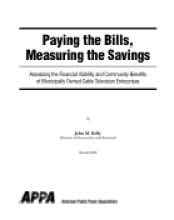By
This paper provides evidence that municipally owned and operated cable television enterprises are financially viable and provide large rate savings to their communities. The findings contradict allegations in Costs, Benefits, and Long-Term Sustainability of Municipal Cable Television Overbuilds, a 1998 paper authored by Ronald J. Rizzuto and Michael O. Wirth, that such enterprises are likely to be poor investments for cities. The authors claim that analysis of financial histories of the cable enterprises in Glasgow (Kentucky), Paragould (Arkansas), and Negaunee (Michigan) “clearly indicates that [they] have been poor investments from a pure business perspective.” They are pessimistic about the fourth, Cedar Falls (Iowa). The authors contend that these enterprises “have not generated [or will not generate] sufficient cash flows to cover their out of pocket cash needs.... None ... [is] currently sustainable over the long run.” However, by the incorrect criteria and analysis that Rizzuto and Wirth use, few new enterprises—public or private—would pass financial muster. The authors further contend that the only reason these utilities have been able to remain solvent is because of various subsidies, personal and property tax transfers, or interest-free loans. Rizzuto and Wirth’s conclusions are not surprising since their paper was partially funded by Telecommunications, Inc. (“TCI”), the private, incumbent cable television provider in Cedar Falls at the time the city was creating its municipal cable enterprise. Although Rizzuto and Wirth’s paper was published seven years ago, critical review of it is timely and important. Formation of municipal cable enterprises is a major public policy issue; private broadband providers have been successful in having several states bar or place crippling limitations on the formation of such enterprises. The time that has elapsed since the paper was published provides a good perspective for checking the authors’ predictions about the financial viability of the four municipal enterprises. Most importantly, however, Rizzuto and Wirth’s paper is often cited currently by those who oppose municipal entry in the cable television industry and related broadband industries. Their paper is widely quoted in reports of other organizations that oppose formation of municipal cable enterprises.



